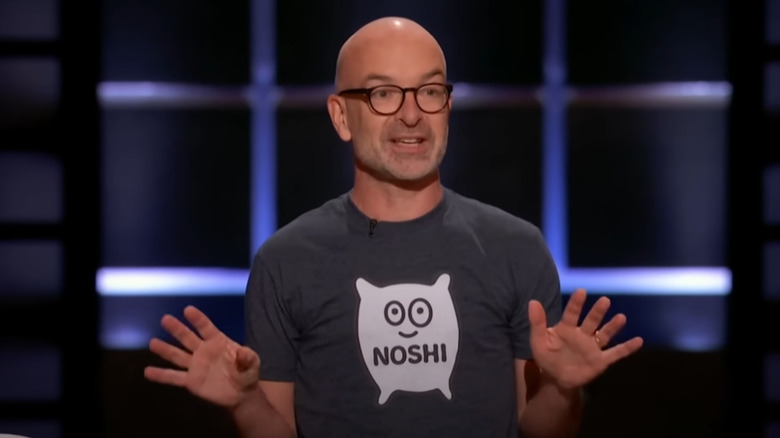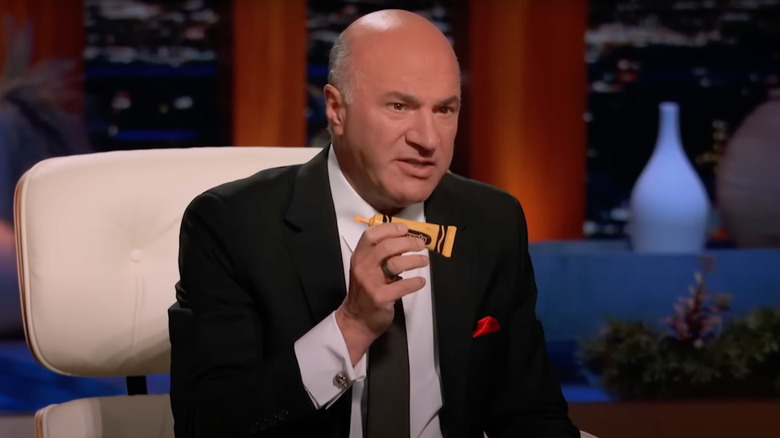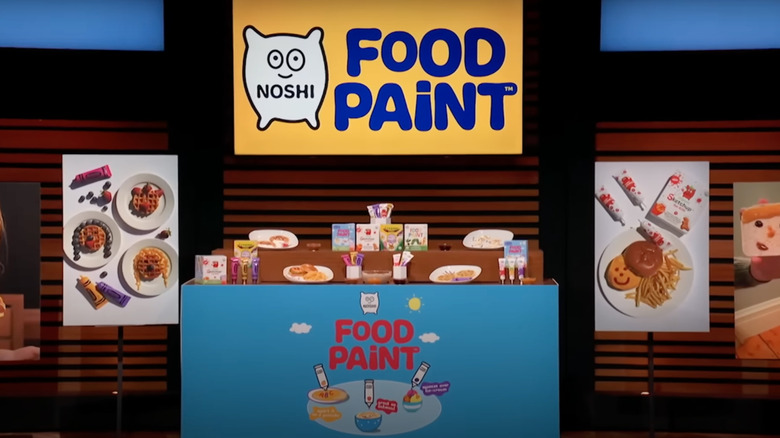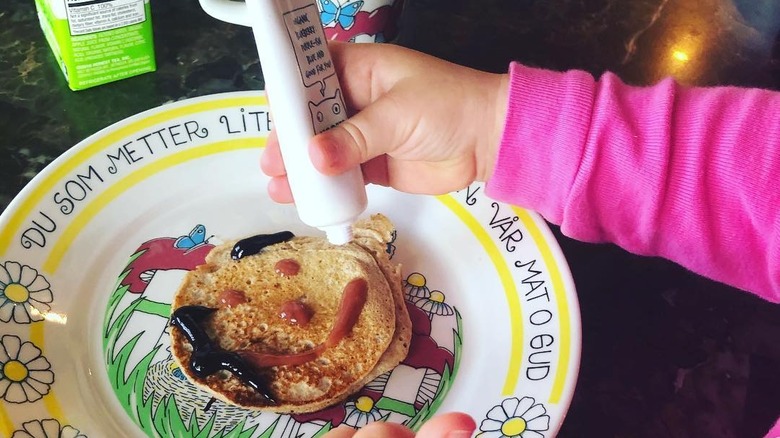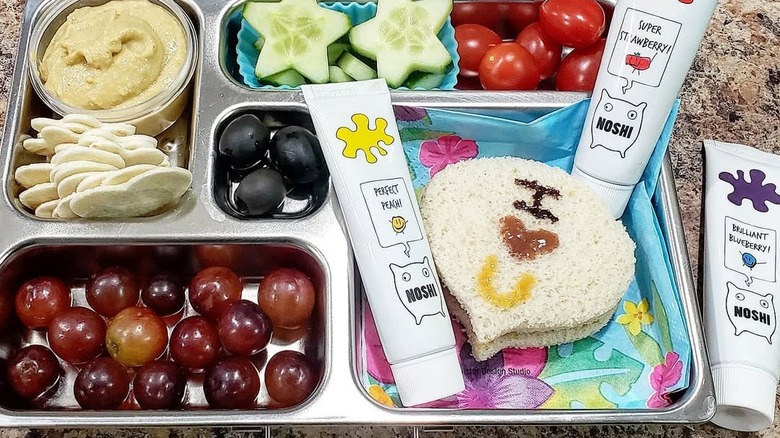Whatever Happened To Noshi From Shark Tank?
We may receive a commission on purchases made from links.
Noshi's story seems ideal for a Hollywood adaptation: In 2015, struggling to get his picky eater kids to the table, Tomo Delaney was desperate to get his kids to eat (as many parents are). When a friend called him with an idea to make edible, organic food "paint" so that dinner time would be more fun, the former fashion photographer immediately jumped on the chance to make it happen. A successful Kickstarter campaign got him the attention of "Shark Tank" producers, who invited him to appear on the show. But the product wasn't ready yet, so Delaney had to turn down the opportunity of a lifetime. (Or so he thought.)
For the next few years, Noshi continued growing slowly, getting partnerships with Crayola and Peppa Pig as well as retailers like Walmart. Still, sales were low and profits remained unimpressive. Things got more difficult when Delaney's wife got sick with long COVID and decided to go back to England so her parents could take care of her while Delaney handled the kids. In 2022, as he was navigating this personal challenge, he reached out to "Shark Tank" and got accepted to be on the show. The next months were spent preparing his pitch with the support of the show's team, which helped him edit and practice it over and over again. When the day finally came, Delaney felt ready to take on the sharks.
What happened to Noshi on Shark Tank?
As he walked through the doors, Delaney crossed his arms and grabbed the sharks' attention by admitting his dinner time struggles. "Why not turn every meal into an art class?" Delaney asked during the segment — which aired on Season 14, Episode 21 in 2023. At this time, the production cost was $2.72 for a pack of three tubes that sold at $3.70 wholesale and $5.46 retailed. One of the biggest selling points of the product was that the "paint" was made with organic, natural ingredients.
Despite getting laughs from the sharks during his presentation, Delaney was met with some difficult questions about his high prices, low profit margins, and slow growth, particularly from Barbara Corcoran and Kevin O'Leary. Although Delaney explained his personal situation and chalked some of the low sales up to a formerly bad box design, this wasn't enough to convince most of the sharks. Corcoran and O'Leary passed with little fanfare. Lori Greiner and Daymond John seemed to feel bad, but ultimately passed citing skepticism about the business model. Mark Cuban was undecided, having questions about the packaging and the high price of the product. Delaney ultimately convinced him by saying he would use the investment to purchase special machinery that would allow him to produce the food paint for $0.60 less per unit. The entrepreneur was seeking $250,000 for 17% equity, but Cuban made a counteroffer of the same amount for 25% equity, which Delaney readily accepted.
Noshi after Shark Tank
Although the show makes it seem like the deals made are final, this isn't usually the case. Once the cameras shut down, there are often lengthy negotiations and what we assume are headache-inducing contract reads and rewrites. Sometimes — as was the case with aspiring food company, Slice of Sauce — deals fail to close entirely. This wasn't the case with Noshi, however. In a 2024 interview, Delaney claimed he communicated regularly with Cuban over email. The business owner said he's found the partnership invaluable, as Cuban often gives him excellent advice on how to improve the business and the product.
The "Shark Tank" episode definitely gave the product some much-needed attention, but it's difficult to know if this translated into a spike in sales. The brand's Amazon listing acquired a mere 111 reviews before the product was listed as unavailable. With a lukewarm rating of 3.2, the food paint garnered some enthusiastic fans but also disappointed many people with its mushy texture and brown color. Delaney did post on his Instagram page asking followers to not buy Noshi from Amazon because third-party sellers were marking up the price too much. It's possible that resellers were sending out old stock that no longer delivered on the promise the product had made, but question remain.
Is Noshi still in business?
As of 2025, Noshi seems to have discontinued its partnership with Walmart, Crayola, and Peppa Pig. It's unclear whether these partnerships were terminated prematurely or if these were intended as limited time offers. As of now, the product as it was pitched to "Shark Tank" isn't readily available anymore.
Despite the rocky situation with its previous partners, Noshi is still in business. That said, the only place we were able to find the product in stock was the company's website, which has three available condiment tubes: chick'n dip, ketchup, and ranch. Unlike previous versions, the products come separately rather than in a pack of three. They're also not branded as Crayola or have any mention of Peppa Pig like they used to. Rather, they have the brand's own mascot, a formless but cute blob. During the "Shark Tank" episode, Cuban suggested Delaney sell the tubes separately so they would be more affordable, an idea that Delaney claimed to like. This could explain the shift in product, though at $5 per 10-ounce tube, this new version of Noshi doesn't exactly bring prices down.
What's next for Noshi?
We're happy to see Noshi hasn't shut down operations entirely, but the company doesn't appear to be thriving as much as fans would hope. But things might be turning around. On April 14th, 2025, the company announced it will soon release new 2-ounce tubes of frosting. The new tubes will have added vitamins, iron, calcium, and phosphorus. As with its other products, we assume these tubes will be certified organic, gluten-free, and kosher.
The condiment tubes currently available on its website also seem to have opened up another business opportunity outside of supermarkets. On a couple of Instagram posts uploaded in November, 2024, Delaney walked into fast food places around New York City like Five Guys and Shake Shack to see if they were using Noshi. In both posts, he is delighted to discover the product is placed on tables and counters.
It's possible the company is pivoting from having consumers buy their own Noshi to selling the product mainly to large fast food chains which will keep it constantly in stock for customers who come in with children. If this pivot is successful, the brand would have the chance to build a faithful commercial customer base where it can eventually make it into individual consumers' homes. If you have picky eaters but can't afford Noshi, try these other interesting strategies to get your kids to eat more vegetables.
